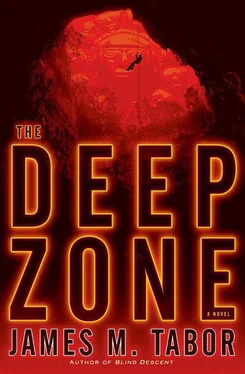“You sure about this?” he said one last time.
“Do it.”
The device had one purpose only: to send an encrypted data burst to a certain satellite, which would relay it to an intended recipient on earth. In this case, that was Gray. Stikes lifted a hinged cover, exposing a red button the size of a dime. He hesitated briefly, then depressed the button and held it for five seconds.
“Done,” he said.
“Done deal ,” Kathan said.
STAGGERING FROM EXHAUSTION, EYES POURING TEARS FROM the sudden glare, face bruised and swollen and with several cuts oozing blood, Hallie came out of the cave into the world of light. She had no idea how long she had been moving since the encounter with Cahner. Many, many hours, more than she could remember. It was daylight—that was all she knew and all she needed to know.
Her body hummed with pain. But she was out. She was out and she had the moonmilk. Her eyes would gradually calm down, the cuts would heal, the bruises would fade, the bumps and sprains would ease. Normally, when she came out of a cave, she felt a mixture of exhilaration and sadness, thrilled by the adventure and sad that it was ending. But not this time.
Stepping through the mouth of the cave had been like crossing the finish line of a marathon, squared. She had focused so hard, and for so long, on reaching the goal that when she finally made it, everything fell apart. It was all she could to do shrug off her pack, let it fall, and drop down beside it.
For a while she just sat in a fog of exhaustion and pain, eyes blinking against the light, unfocused, unseeing. After a long time, thoughts began to coalesce. She thought of the EPIRB in her pack, an emergency signaling device, employing a secure frequency similar to those downed military pilots used to call for rescue. She had a radio, too. Bowman had given one to each team member. He had said to first activate the EPIRB, alert the extrication team, then wait for comm on the radio. She opened her pack and started rooting around, trying to find the EPIRB. Then she stopped. It was daylight. They would not come in daylight. There was no point in risking detection now, when they could not come. She would have to hide until nightfall.
Back into the cave. Oh God .
But she did not move. She had become little more than the collection of her primal needs, hunger and thirst chief among them just now. She leaned toward her pack again and rummaged in it for something to eat or drink. She found a crushed energy bar and an empty water bottle. Bowman’s flask caught her eye, so she took that out. Little early for a drink, but what the hell .
She munched some of the energy bar and washed it down with a sip from the flask. The fiery rum burned taken straight like this, but it was better than anything she had ever tasted, good enough to cut through some of the fatigue like a light beam through fog and kindle a little spark in her brain.
Easy, girl. Won’t take much to get you stumbling drunk. Can’t have that .
She put the flask away, stood, hefted her pack, and turned toward the cave. Then a glint caught her eye, all the way across the meadow, sunlight glancing off the cenote’s still, shining surface. She looked at the water, kept looking, and felt something like great thirst arising in her. She was thirsty and would drink, but this was an urge of another kind: to feel water’s cleaning, healing touch all over her body. Hallie was filthy. “Disgusting” was the word that came to her mind. She had not bathed for more than a week. She couldn’t remember when she had run out of toilet paper, but it had been some time ago. After she had passed through Batshit Lake on the way out, there’d been no waterfall to shower beneath, so the stuff was drying and caking, giving off an unholy stink, layered over all the accumulated dirt and sweat and mud from the previous week. Some of her cuts had crusted and scabbed, and each one of those felt like a nail stuck through her flesh. She looked at the cenote and thought of all that cool, clear water. Thought of how good, no, how exquisite it would feel to wash again in pure water, to be clean , to actually see her own skin, to have the searing pains cooled and soothed.
“It will only take ten minutes.” She said this out loud and headed for the cenote. At its edge she dropped her pack, removed her boots and socks, stripped off the filthy caving suit. She took off her red long underwear and, wearing only a sport bra and panties, walked to the pool’s rocky lip, and dove straight in, entering with barely a splash.
It felt every bit as good as she had imagined it would. Better . She could not think of a word powerful enough to describe the feeling, in fact. The water was cool but not cold, caressing, cleansing, and she swam easily, relishing the smooth flow against her skin. She stroked out to the middle of the cenote and floated there, rubbing her face and pulling fingers through her hair. She turned over on her back and let the water hold her up, moving her legs and arms in great arcs, as though making a snow angel, limbering stiff muscles, relishing the water’s lovely touch.
She did a quick surface dive and swam straight down for twenty feet, then thirty, the light dimming, feeling the pressure. She equalized her ears continually, the action automatic from having done so much scuba diving. She turned toward the surface and pulled up as fast as she could, bursting out of the water and falling back with a loud splash and a barely stifled cry of joy.
God, it felt good. And it felt good to move in water. She knew of no better therapy for a sore body. She also knew that she was going to have to get out and carry on soon. But just a couple more minutes wouldn’t hurt. She turned over on her belly and began swimming with a slow, graceful crawl, gulping a bite of air over her shoulder with every other stroke, long arms pulling at the water. Ten feet short of the cenote’s far wall, with unbroken forest looming up just beyond the edge, she pulled up and treaded water.
And then she saw the floating cigarette butts.
“PULL!” SAID BERNARD ADELHEID.
A steward pushed a button and the cage’s spring-loaded top flew open. A ruffed grouse exploded out of the cage, soared up and away from the yacht’s fantail, a dark slash across white clouds. Adelheid swung his Purdey shotgun right to left, smooth as an artist stroking paint on a canvas. The shotgun roared once and the grouse’s flight ended in a red burst of feathers and blood. Adelheid broke the Purdey, withdrew the spent shell from its smoking breech, reloaded. “Your shot,” he said to Nathan Rathor.
Nathan Rathor had no love of yachts or oceans. He wasn’t prone to seasickness, had always been blessed with a strong stomach. What he found nearly unendurable was being at the mercy of an uncontrollable force like the sea. But he also knew that there was nothing like a boat and vast expanses of open water for communications security. Unless someone managed to bug your vessel, of course, but no one was likely to get a bug into any boat that carried Bernard Adelheid.
Standing next to Adelheid while the man was holding a loaded shotgun would not have been one of Rathor’s first choices of places on earth to be. But when the man called, you came, and when he wanted to shoot, you shot. Rathor had shot skeet before, of course, though always with clay pigeons, and that was what he had expected to be shooting at this sunny afternoon on the Atlantic, twenty miles east of Cape May, New Jersey. But Adelheid had said, “There is little sport in shooting dead things, would you not agree? These grouse are legendary, one of the most difficult wing shots on earth.”
Читать дальше












